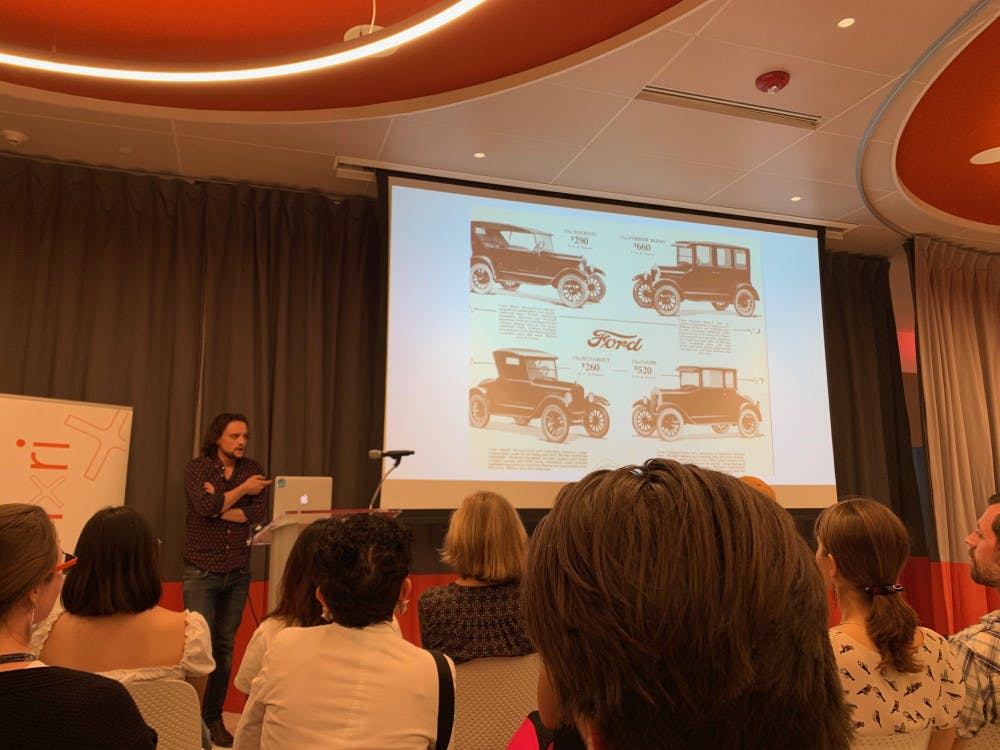During a lecture Monday evening, Ben Guhin, head of design at the University’s Policy Lab, explained how companies and governmental bodies could use design not just to create a product’s aesthetic, but to further accessibility.
Pulling from his experience working for the Consumer Protection Financial Bureau and as the Head of Design and Technology Policy for the city of Austin, Guhin said that people who work in government “can provide opportunities to create a more inclusive and equitable community.”
At the CPFB, Guhin attempted to improve the accessibility of government forms and information. He tried to address “categories of accessibility” beyond physical to include language and technological accessibility as well. “Technology can bring us together,” but it can also “pull us apart,” Guhin said while discussing avenues to improve the digital world’s accessibility.
This is an issue that motivated Niyoshi Parekh ’22 to attend the event. Parekh said she was interested in understanding how design could further economic and social accessibility.
To alleviate economic inaccessibility, companies and government agencies need to go further than putting relevant information online, Guhin said. Content needs to be simple and easy to read, he said, adding that keeping “helper text” visible clarifies language.
Guhin also said that companies and governmental bodies need to consider making content “ceaselessly functional,” so that devices can continue to access the material even as they age.
A rule of thumb is making “the best thing the easiest thing,” Guhin said.
Sara Pollard, senior UX designer at Infosys Digital in Providence and an attendee of the event, agreed with Guhin. “As a designer, I’m always trying to think of how things can be stripped down so that they’re simple.”
Guhin also emphasized “refining and testing” and “doing and learning” when creating an interface or crafting online content. “It requires the humility, especially as a government employee, to know ‘I am not providing the service as well as I can, and I don’t have to be embarrassed about that,’” he said. “You really unlock a lot of potential when you stop being embarrassed.”
Guhin then expanded the conversation to designing for inclusion more generally. Citing the addition of curb cuts to sidewalks to accommodate wheelchair users and creating OXO vegetable peelers for people with arthritis, Guhin pointed out instances where government agencies and companies tried to create specific products for “edge cases,” but ended up designing for everyone.
Director for The Policy Lab David Yokum added that the “government does a lot of stuff, and if we want it to do better for us, we really need to bring to bear lots of diverse skill sets and perspectives.”
Guhin’s talk was part of Design Week RI 2019, the sixth iteration of a week of events hosted by DESIGNxRI. The week aims to “highlight and showcase the design talent here in Rhode Island,” said Lisa Carnevale, founder and executive director of DESIGNxRI.
The talk was the first time DesignxRI has collaborated with The Policy Lab, Carnevale said. The Policy Lab is a new collaboration between the state of Rhode Island and the University, launched in an effort to develop “data-driven solutions,” according to its website. Although The Policy Lab’s work was new to Carnevale, she finds “spin-off effects” of rapid technological changes extremely important. With the onset of a period that Carnevale referred to as the “fourth industrial revolution,” she added that discussing and understanding design’s critical role in technology’s evolution is essential.





